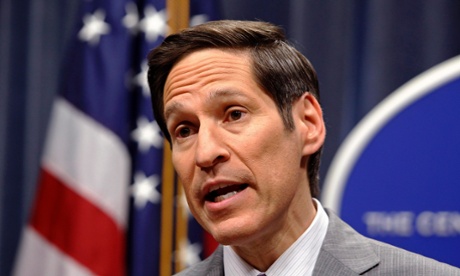
A man who flew from Liberia to Texas has become the first person diagnosed with Ebola in the US as a surge of international pledges is failing to stem the outbreak centred in three west African countries.
The diagnosis on Tuesday brings the disease, which has killed about 3,100 people in west Africa, to America. The man sought treatment six days after arriving in Texas on 20 September and was admitted two days later to an isolation room at Texas Health Presbyterian hospital in Dallas.
“It is certainly possible someone who had contact with this individual could develop Ebola in the coming weeks,” Dr Thomas Frieden, director of the US Centres for Disease Control and Prevention, said during a news conference. But he added: “I have no doubt we will stop this in its tracks in the United States.”
By contrast, the outbreak has accelerated across Guinea, Liberia and Sierra Leone as health workers warned a new round of promised aid has so far failed to translate into a meaningful response on the ground.
A sluggish initial response has picked up in recent weeks. But Joanne Liu, president of Médécins sans Fontières, the non-governmental organisation leading efforts, said that rhetoric needs to be translated into action. “Everybody in their intentions [is] moving fast, but in the field we are moving at the speed of a turtle,” she said in an interview with US station NPR.
Each day, doctors would remove the dead from their beds and admit the same number of patients crowding at the gates of the MSF treatment centre in the Liberian capital Monrovia. “We only open one of our centres for 30 minutes, just to admit people who can fill in the beds of the people who died overnight. This is how bad it is. And the rest of the day, we are turning patients back home to go and infect their neighbours and loved ones. So this is not at all under control.”
About 6,500 infections reported by the end September is likely to be only a half or a third of the total number, experts say. Liberia, the hardest hit country, accounts for about 1,000 deaths – almost a third of all fatalities.
Such reports appear to have galvanised the international community. The UN, in its first mission for a public health emergency, opened a regional headquarter in Accra in Ghana this week, which will serve as an air bridge to affected countries.
“Stopping Ebola is a priority for the United States,” Barack Obama said, shortly after ordering 3,000 US troops to Liberia. “We will continue to lead, but this [also] has to be a priority for everybody else.”
As a percentage of population, Cuba has been one of the highest contributors. The island state has sent 461 doctors and nurses to the epidemic. China has sent a 59-person mobile lab to Sierra Leone, while Britain said it will build facilities for 700 new beds, although that may take weeks to materialise. More than 160 NHS volunteers are due to arrive in Sierra Leone following an appeal.
Eight hundred beds have been promised by the international community – less than a third of the 3,000 the World Health Organisation says is urgently needed to meet demand. The global health body estimates up to 250 medical staff are needed to safely manage every 70 beds. “All agreed that the demands of the Ebola outbreak have completely outstripped the government’s and partners’ capacity to respond,” the WHO said in its most recent assessment.
In a sign of how desperate the situation is, drastic measures taken in neighbouring Sierra Leone include the quarantine of five of the country’s 13 counties. More than 2 million – a third of the population – are affected by the cordon sanitaire. About 600 have died of the disease.
On Tuesday, scenes of joy erupted in the city of Makeni after a group of people who had tested negative from Ebola had insisted the epidemic was over. Health authorities were forced to broadcast messages debunking the rumours, with the police eventually called in to enforce a curfew.
“I can tell you, people were out dancing in the streets. Imagine our disappointment to realise that the terrible Ebola is far from finished,” said Solomon Faley, a rice farmer who has lost two relatives to the disease.
